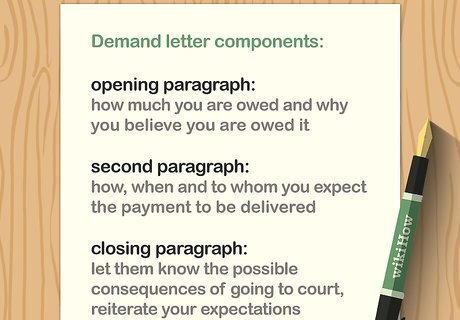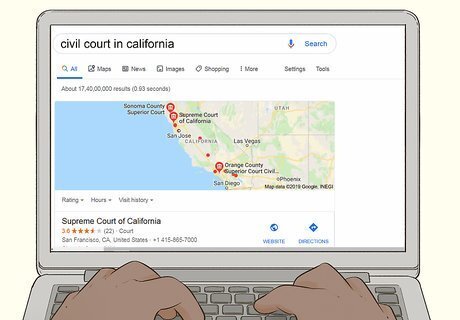
views
X
Research source
Suing in Small Claims Court

Gather information about your claim. Before you start filing a lawsuit, get together information about the contractor you want to sue and the work they were supposed to perform. Pull out the contract you signed with the contractor, which should contain the information you need. If you didn't have a written contract with the contractor, you can still sue, but the amount of money you can get may be limited. It also may be difficult to prove the existence of an agreement to perform particular work in the absence of a written contract. Consult an attorney to discuss your options. To sue the contractor, you must use the contractor's legal name. Even if you knew the contractor by their individual name, they may have an official business name registered with your state. If that name isn't included on a written contract, search the business name directory on the website of your state's Secretary of State. Gather any invoices, receipts, or cancelled checks you have that are associated with payments you made to the contractor.

Find out how long you have to file a lawsuit. Every state has a statute of limitations that provides deadlines for filing lawsuits. Which deadline you use depends on the nature of your claim against the contractor. Look for these deadlines on the website for civil courts in your state. You could also call the small claims court clerk's office, or go to a public law library or legal self-help center at your local courthouse. If the contractor violated a written contract, you typically have several years to file your lawsuit. If you're arguing the contractor was negligent in completing the work for you, on the other hand, you may have less time.

Calculate your damages. The amount of damages you're claiming will determine whether you can sue the contractor in small claims court. If the amount of damages is greater than the maximum amount allowed in small claims, you'll have to file your lawsuit in civil court. One way to find out the amount of damages to which you're entitled is to go to the website of the board or agency that licenses contractors in your state. Information is also available on the state court's website, at a public law library, or at a legal self-help center. In some states, small claims courts can handle claims of up to $10,000. However, many states limit recoveries in small claims to $5,000 or less. In most cases, you can't get around this limitation by claiming less money than you're entitled to by law. If you're not eligible to sue in small claims, you can still sue in your state's civil court. The only difference is that the process is somewhat more complicated and it may take more time to resolve your issue.

Send a demand letter to the contractor. In some states, you're required to send a demand letter before you can file a lawsuit in small claims court. When you file your lawsuit, you may be required to provide a copy of the demand letter to the court. Particularly with contractors, your state's law may require that you give them the opportunity to fix any problems before you sue them. The board or agency that licenses contractors will have more information on these requirements. Be specific about the problem and what you want the contractor to do to resolve it. Attach any photos or documents that support your demands. Give the contractor a deadline to respond. Two weeks from the date of receipt is typically sufficient. Send the letter using certified mail with return receipt requested. That way you'll know when your letter was received.

Get paperwork from the appropriate small claims court. You don't need an attorney to file a lawsuit in small claims court. Many states even forbid attorneys from representing clients in small claims courts. The forms to file a claim are available at the court clerk's office. Some courts also make small claims court forms available for download from the court's website. Forms can differ among courts even in the same state, so get the forms for the specific court where you're going to file your claim. Usually this is the small claims court in the county where the work was done.

File your claim. Your small claims court forms typically include instructions on how to complete and file the required forms. You may be able to mail them in, but typically you'll need to make a trip down to the clerk's office to file your forms in person. Pay the filing fee, typically under $100. If you can't afford the filing fee, ask the court clerk if you can apply for a fee waiver. The court may waive your fees if you have a low income, or if you receive certain types of public assistance, such as AFDC or food stamps.

Have the contractor served. The contractor must know that you've filed a lawsuit against them so they have the opportunity to respond. Hire a sheriff or private process server to deliver the court papers to the contractor. You'll have to pay a small fee to have the contractor served, typically around $20. Sheriff's departments in some areas waive this fee if you've been granted a fee waiver by the courts. The contractor will receive a summons to appear in court, as well as a copy of your claim. You will be notified when the contractor has been served with those papers.

Appear on the date of your hearing. Organize your court papers along with any documents or photos you want to show the court to back up your claim. Take these with you to your court date. If you don't show up on the date of your hearing, the court will dismiss your claim. Small claims court is less formal than civil court, but you should still dress in neat, conservative clothing. The clerk's office may have information on appropriate court dress and conduct. Take a seat in the gallery and step forward when your name is called. If the contractor doesn't show up on the court date, you may win your claim by default. In some courts, you still must prove to the judge that you're entitled to the specific amount of money you've claimed.
Suing in Civil Court

Verify your suit doesn't qualify for small claims. Filing a law suit in civil court is time-consuming and expensive. In most cases, you'll get quicker relief by suing the contractor in small claims court. Generally, your total claim must be below a specific dollar amount to be eligible for small claims court. In some states this is only a few thousand dollars, but in others it can be as much as $10,000. Usually you can only sue for money in small claims court. If you want the contractor to do something, you may have to file your lawsuit in civil court. For example, suppose the contractor did work on your house that they promised was up to code. Later, your house failed inspection. You would typically have to sue the contractor in civil court, rather than small claims, if you wanted them to come back and do the work necessary to bring it up to code.

Consult an attorney. While you can represent yourself in civil court, the rules and procedures are more formal than in small claims. An attorney will already be familiar with these rules and procedures and can help you better navigate the court system. Most attorneys offer a free initial consultation. Take advantage of this opportunity to speak with 2 or 3 attorneys before you make your final decision on who to hire. Look for an attorney who is relatively established in your local area and has experience with lawsuits similar to yours.

Identify the correct court. In most cases, if you want to sue a contractor in civil court, you'll use the court in the county where the work was done. You may have to use a different court, however, if the contractor is located in another county or out of state. The name of the court to use differs among states, but you're looking for the lowest civil court level. It may be called the county court or the district court. You'll almost always sue a contractor in state court. You can't use federal court for these kinds of cases unless the contractor is located in a different state and you're asking for more than $75,000 in damages.

Draft your complaint. If you've hired an attorney, they will do most of the work involved with drafting the complaint to initiate your lawsuit in civil court. Most civil courts have forms you can use if you've decided to file the lawsuit on your own without representation. Through the complaint, set forth the facts of the dispute that you believe constitute a violation of state law. A lawsuit against a contractor typically alleges either that the contractor breached their contract with you in some way, or that they were negligent in completing the work. Contact the court clerk to find out if there are forms you can use. Your court may have a legal self-help center that can provide you with forms and assistance. You also may be able to download forms from the court website. Get forms that are valid for use in the court where you'll be filing your lawsuit.

File your complaint. When you've completed your complaint and any other required forms, take them to the clerk of court. Have the originals of all documents with you, plus at least 2 copies. The filing fee in civil court is typically several hundred dollars. If you're not able to pay the filing fees, ask the clerk for a fee waiver application. The application requires information about your income and finances, and you may have to appear before a judge. The clerk will file-stamp your documents and give the copies back to you.

Have the contractor served. Once you've filed your complaint, you have a limited period of time to let the contractor know about the lawsuit through service of process. Hire a sheriff's deputy or private process server to deliver the court papers to the contractor. The fee to have the documents served is typically around $20. Once service is complete, file your proof of service document with the court. Sometimes the sheriff's deputy will take care of filing this document for you, but ask beforehand. In addition to serving the contractor, you may also have to serve a copy of the forms on the licensing board or agency in your state. That board or agency will have information on whether they must be served. If the contractor was bonded and you want to go against the bond, have the court papers served on the company that holds the bond. Contact information for the bond company should be included in your work contract.

Participate in the discovery process. When the contractor is served with your complaint, they'll have a limited period of time to respond. After their response is filed, the "discovery" phase of the litigation process begins. Through this process, both you and the contractor gather evidence and information about the case. You may have formal interviews of the contractor and their employees. The contractor (or their attorney) may interview you as well. These interviews are called "depositions," and take place under oath with a court reporter present to transcribe the proceedings. You also may request documents from the contractor, including contracts and records related to your dispute.

Proceed to trial. Unless you and the contractor are able to come to an agreement, start preparing for the formal trial. At trial, a judge or jury will listen to both you and the contractor, along with any witnesses you call. Organize all of the documents, photos, and other evidence you want to use in trial. If you've never been to a civil trial before, go to the court house and watch one so you can gain familiarity with court conduct and procedures. Often, civil cases are settled at some point during the discovery process. The contractor may make a calculated decision that it's better to pay you at least some of what you've demanded rather than facing the uncertainty of trial.
Using Alternate Dispute Resolution

Check for an arbitration clause in the contract. The contract you signed with the contractor may include an arbitration clause that lists a specific arbitration or mediation service you should use. In some states, licensed contractors are required to include this clause in all contracts. The state licensing board provides the arbitration or mediation service for contractor disputes.

Gather information about your dispute. Your dispute typically must meet certain criteria to be qualified for settlement using an arbitration or mediation service. Before you start the process of applying for arbitration or mediation, get your contract and other basic information together. Most licensing boards have online directories where you can quickly check the status of your contractor's license, or you can call the licensing office. If contact information isn't included in your work contract, search online for "contractor license" with the name of your state. Some states have arbitration and mediation services available for free, or at a reduced rate. These services typically are only available if your contractor had a license in good standing when they entered the contract with you. Use the online directory to verify your contractor's license status, or call the licensing board directly.

Contact an arbitration or mediation service as soon as possible. If there isn't a specific arbitration or mediation service named in your contract, find one nearby that can handle your dispute. Check with your state's licensing board or agency. They should have a list of services they recommend for contractor disputes. If you get started as soon as you discover the problem, you shouldn't have any difficulties. There may be a deadline in your contract that could give you trouble if you delay. Your state licensing board also may have its own deadlines, after which you can't recover money for your dispute. The licensing board may have its own arbitration or mediation program. These programs typically provide a low-cost alternative to resolving disputes outside the court system. It's worth contacting the service you plan to use before you fill out an application. Find out if there are specific criteria your dispute must meet to qualify for their services, and how much it costs to use them.

Submit an application. Most mediation and arbitration services have an application form for you to use. Provide contact information for yourself and the contractor, as well as basic facts about your dispute. You may be required to provide a copy of your work contract, and any receipts or other documents related to the work.

Wait for a response to your application. Different services have their own procedures, but usually notify you by mail if your application is accepted. This notice typically includes the name of the mediator or arbitrator who has been assigned to your dispute, and deadlines for filing various forms and documents. If the service declines to resolve your dispute, your notice will explain why your application was denied. If you believe the denial was in error, you may be able to submit additional information to demonstrate that your dispute qualifies under their rules. You may also be able to file a lawsuit, provided you do so before your state's deadline for filing lawsuits against contractors.

Provide evidence to the arbitrator or mediator. The arbitrator or mediator you use typically gives you a deadline by which you must provide all the physical evidence or names of witnesses you plan to use to support your claim. The contractor also may have evidence to provide. The rules for evidence typically are more relaxed than those you would encounter in court. However, there will still be rules you'll have to follow. For example, if you have witnesses, they can only speak to information they know first-hand – not something they heard from someone else.

Attend your hearing. A mediation or arbitration hearing is much less formal than a court hearing, but it's still professional. Dress conservatively and have all of your documents and evidence organized. Arbitration hearings usually have procedures similar to an actual trial. A mediation, on the other hand, involves negotiation between you and the contractor, with the mediator acting as a go-between to help you arrive at an agreement. You may want to have an attorney to represent you. Unlike in court, you may not be able to get attorney's fees from the contractor, even if you prevail.




















Comments
0 comment